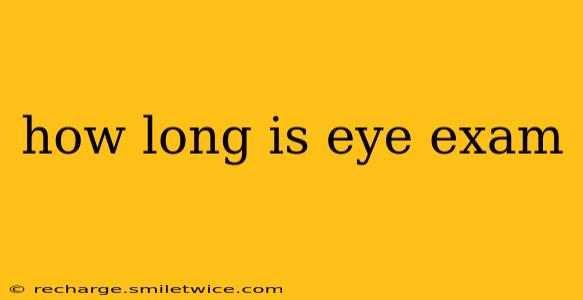How Long Is an Eye Exam?
The length of an eye exam can vary significantly depending on several factors. While a routine checkup might only take 30 minutes, a more comprehensive exam could easily extend to an hour or even longer. Let's break down what influences the duration of your visit.
What factors affect the length of an eye exam?
The time required for your eye exam depends on several key aspects:
-
Your individual needs: A routine exam for a healthy adult with no vision problems will be quicker than an exam for someone with existing conditions like glaucoma, cataracts, or macular degeneration. These conditions require more in-depth testing and analysis.
-
The type of exam: A basic vision screening might only test your visual acuity, while a comprehensive dilated eye exam includes a broader assessment of your eye health, including the retina and optic nerve. Dilated exams naturally take longer as your pupils need time to dilate and then constrict again.
-
The ophthalmologist or optometrist's approach: Some practitioners may be more thorough than others, dedicating more time to patient interaction and explanation of findings.
-
Additional tests required: Depending on your individual needs or any concerns raised during the exam, additional tests may be necessary. This could include visual field tests, OCT scans, or other specialized diagnostic procedures that will extend the overall examination time.
How long is a routine eye exam?
A routine eye exam, focusing primarily on visual acuity and refractive error, typically lasts between 30 and 45 minutes. This usually includes:
- Visual acuity test: Checking your ability to see at various distances using an eye chart.
- Refraction test: Determining your prescription for glasses or contact lenses.
- Eye pressure check: Measuring intraocular pressure to screen for glaucoma.
How long is a comprehensive eye exam?
A comprehensive eye exam is much more extensive, providing a thorough assessment of your overall eye health. It can easily take 45 minutes to an hour, or even longer. This type of exam often includes all the elements of a routine exam plus:
- Pupil dilation: Widening your pupils with eye drops to allow a better view of the retina and optic nerve. This process itself takes time, as the dilation typically takes 20-30 minutes to take full effect.
- Retina and optic nerve examination: A detailed assessment of the back of the eye to detect any signs of disease.
- Visual field test: Assessing your peripheral vision.
What if my eye exam takes longer than expected?
Don't be alarmed if your exam takes longer than anticipated. A thorough examination is crucial for maintaining good eye health. Your eye care professional is likely taking the necessary time to address any specific concerns or perform additional tests for a more accurate diagnosis.
How often should I have an eye exam?
The frequency of eye exams varies depending on your age, health, and risk factors. It's always best to consult your ophthalmologist or optometrist for personalized recommendations, but general guidelines often suggest:
- Children: Regular eye exams are crucial for children to detect any vision problems early.
- Adults (under 40 with no issues): Every 2 years is generally recommended.
- Adults (over 40): More frequent exams are recommended to screen for age-related eye diseases.
In conclusion, the duration of an eye exam is highly variable. While a quick check-up might only take 30 minutes, a thorough comprehensive exam may last an hour or more. Understanding the factors that influence the length of your appointment allows for better planning and a more informed approach to your eye care. Remember to always communicate any concerns you have with your eye care professional.
